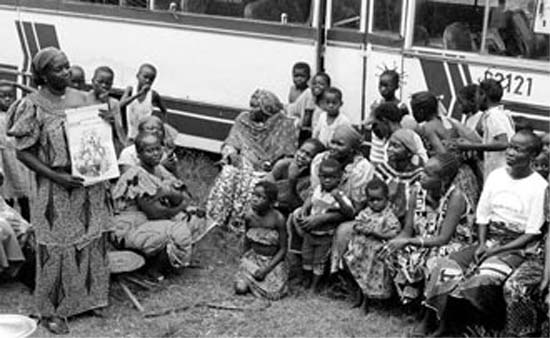
"According to my research, the major difference lies in transmission rates of the virus. For a given unprotected sexual relationship with an HIV-infected person, Africans are between four and five times more likely than Americans to become infected with HIV themselves. This stark fact accounts for virtually all of the difference in population-wide HIV rates in the two regions. There is more than one reason why HIV spreads more easily in Africa than America, but the most important one seems to be related to the prevalence of other sexually transmitted infections. Estimates suggest that around 11 percent of individuals in Africa have untreated bacterial sexually transmitted infections at any given time and close to half have the herpes virus. Because many of these infections cause open sores on the genitals, transmission of the HIV virus is much more efficient. "
Emily Oster writes: Three Things You Don't Know About Aids In Africa
Three Things You Don't Know About Aids In Africa
A brilliant young economist's surprising ideas about HIV.
By Emily Oster
December 2006, Volume 146, Issue 6
At just twenty-six, economist Emily Oster may have the highest controversies-generated-to-years-in-academia ratio of anyone in her field. That's because, as a Ph.D. student at Harvard, she chose to hop the fence and explore a topic already claimed by doctors, social scientists, and policy wonks: the AIDS epidemic in Africa. Her studies suggest some uncomfortable possibilities�not least that the so-called experts have gotten their approach to the crisis dead wrong.
Now a Becker Fellow at the University of Chicago, Oster continues to blur academic boundaries with further work on AIDS and a volatile new interest: the reported wave of female infanticide in Asia.
When I began studying the HIV epidemic in Africa a few years ago, there were few other economists working on the topic and almost none on the specific issues that interested me. It's not that the questions I wanted to answer weren't being asked. They were. But they were being asked by anthropologists, sociologists, and public-health officials.
That's an important distinction. These disciplines believe that cultural differences�differences in how entire groups of people think and act�account for broader social and regional trends. AIDS became a disaster in Africa, the thinking goes, because Africans didn't know how to deal with it.
Economists like me don't trust that argument. We assume everyone is fundamentally alike; we believe circumstances, not culture, drive people's decisions, including decisions about sex and disease.
I've studied the epidemic from that perspective. I'm one of the few people who have done so. And I've learned that a lot of what we've been told about it is wrong. Below are three things the world needs to know about AIDS in Africa.
1. It's the wrong disease to attack.Approximately 6 percent of adults in sub-Saharan Africa are infected with HIV; in the United States, the number is around 0.8 percent. Very often, this disparity is attribu ed to differences in sexual behavior�in the number of sexual partners, the types of sexual activities, and so on. But these differences cannot, in fact, be seen in the data on sexual behavior. So what actually accounts for the gulf in infection rates?
According to my research, the major difference lies in transmission rates of the virus. For a given unprotected sexual relationship with an HIV-infected person, Africans are between four and five times more likely than Americans to become infected with HIV themselves. This stark fact accounts for virtually all of the difference in population-wide HIV rates in the two regions.
There is more than one reason why HIV spreads more easily in Africa than America, but the most important one seems to be related to the prevalence of other sexually transmitted infections. Estimates suggest that around 11 percent of individuals in Africa have untreated bacterial sexually transmitted infections at any given time and close to half have the herpes virus. Because many of these infections cause open sores on the genitals, transmission of the HIV virus is much more efficient.
So what do we learn from this? First, the fact that Africa is so heavily affected by HIV has very little to do with differences in sexual behavior and very much to do with differences in circumstances. Second, and perhaps more important, there is potential for significant reductions in HIV transmission in Africa through the treatment of other sexually transmitted diseases.
Such an approach would cost around $3.50 per year per life saved. Treating AIDS itself costs around $300 per year. There are reasons to provide AIDS treatment in Africa, but cost-effectiveness is not one of them.
It won't disappear until poverty does.
In the United States, the discovery of the HIV epidemic led to dramatic changes in sexual behavior. In Africa, it didn't. Yet in both places, encouraging safe sexual behavior has long been standard practice. Why haven't the lessons caught on in Africa?
The key is to think about why we expect people to change their behavior in response to HIV�namely because, in a world with HIV, sex carries a larger risk of death than it does in a world without HIV. But how much people care about dying from AIDS ten years from now depends on how many years they expect to live today and how enjoyable they expect those future years to be.
My studies show that while there have been very limited changes in sexual behavior in Africa on average, Africans who are richer or who live in areas with higher life expectancies have changed their behavior more. And men in Africa have responded in almost exactly the same way to their relative �life forecasts� as gay men in the United States did in the 1980s. To put it bluntly, if income and life expectancy in Africa were the same as they are in the United States, we would see the same change in sexual behavior�and the AIDS epidemic would begin to slow.
There is less of it than we thought, but it's spreading as fast as ever.
According to the UN, the HIV rates in Botswana and Zimbabwe are around 30 percent, and it's more than 10 percent in many other countries. These estimates are relied on by policymakers, researchers, and the popular press. Yet many people who study the AIDS epidemic believe that the numbers are inflated.
The reason is quite simple: bias in who is tested. The UN's estimates are not based on diagnoses of whole populations or even a random sample. They are based on tests of pregnant women at prenatal clinics. And in Africa, sexually active women of childbearing age have the highest rates of HIV infection.
To eliminate the bias, I took a new approach to estimating the HIV infection rate: I inferred it from mortality data. The idea is simple: In a world without HIV, we have some expectation of what the death rate will be. In a world with HIV, we observe the actual death rate to be higher. The difference between the two gives an estimate of the number of people who have died from AIDS, and we can use that figure to estimate the prevalence of HIV in the population.
My work suggests that the HIV rates reported by the UN are about three times too high. Which sounds like good news�but isn't. The overall number of HIV-positive people may be lower than we thought, but my study, which estimated changes in the infection rate over time, also drew a second, chilling conclusion: In Africa, HIV is spreading as quickly as ever.
















